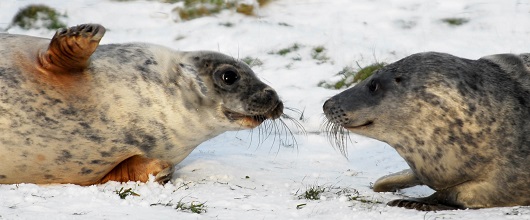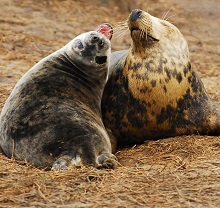Hormone boost makes wild seals spend more time with each other

Scientists at the University of St Andrews have discovered that grey seals are friendlier and want to spend more time with each other when their levels of the hormone oxytocin are increased.
Oxytocin occurs in all mammals, and plays a vital role in parental and social bonding, and treatments are increasingly being used in medical trials to treat human psychological conditions such as autism.
Understanding how to give oxytocin to individuals, and what behaviours will be changed by the treatments, is crucial to developing safe medical applications for the hormone.
New research funded by the National Environmental Research Council (NERC) and published today (24 May 2017) in the Proceedings of the Royal Society B by Dr Kelly Robinson, a research fellow at the Sea Mammal Research Unit (SMRU), and colleagues at the University of St Andrews and Durham University shows that increasing oxytocin levels causes pro-social behavioural changes that persist across several days in wild grey seals.
During the study on the Isle of May off the coast of Fife, Scotland, Dr Robinson carried out oxytocin treatments on grey seals that had never met each other previously, and recorded their behavioural responses.
 Pairs of seals given the hormone spent more time in close proximity to each other, were less aggressive and spent less time investigating the other individual (an indication of familiarity) than pairs given control saline treatments. The behavioural changes triggered by the oxytocin treatment were still present in the seals at least two days after receiving oxytocin, long after the hormone would have been broken down.
Pairs of seals given the hormone spent more time in close proximity to each other, were less aggressive and spent less time investigating the other individual (an indication of familiarity) than pairs given control saline treatments. The behavioural changes triggered by the oxytocin treatment were still present in the seals at least two days after receiving oxytocin, long after the hormone would have been broken down.
Oxytocin concentrations have been linked to how close grey seal mothers stay with their pups. By using an oxytocin dose that mimics natural concentrations in this species, the study confirmed that elevated oxytocin encourages individuals to remain close to each other. This is the first time it has been possible to verify an oxytocin-behaviour relationship in wild individuals.
 Researchers also found that treatment with the hormone additionally triggered low aggression and less investigation of unfamiliar individuals, pro-social behaviours that occur independently of natural oxytocin release in seals.
Researchers also found that treatment with the hormone additionally triggered low aggression and less investigation of unfamiliar individuals, pro-social behaviours that occur independently of natural oxytocin release in seals.
Dr Robinson said: “This study proves that oxytocin promotes individuals staying together, highlighting its fundamental role in forming and maintaining parental and social bonds.
“By studying the underlying physiology motivating bonding, social and parental behaviour, we can better understand what factors influence their existence in a variety of animals including humans. It also allows us to perceive what is happening when such bonds break down, why the frequently negative consequences associated with such losses happen, and how hormone treatments could be used to influence or avoid such events.”
Background information
‘Positive social behaviours are induced and retained after oxytocin manipulations mimicking endogenous concentrations in a wild mammal’ is published under the Proceedings of Royal Society B. The authors are:
Kelly J Robinson – Sea Mammal Research Unit, University of St Andrews
Sean D Twiss – Department of Biosciences, Durham University
Neil Hazon – Scottish Oceans Institute, University of St Andrews
Simon Moss – Sea Mammal Research Unit, University of St Andrews
Patrick P Pomeroy – Sea Mammal Research Unit, University of St Andrews
Issued by the University of St Andrews Communications Office, contactable on 01334 467310/2530 or [email protected].
Category Research